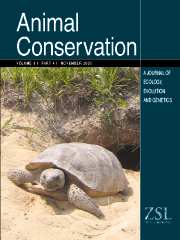Crossref Citations
This article has been cited by the following publications. This list is generated based on data provided by
Crossref.
Deem, Sharon L.
and
Emmons, Louise H.
2005.
EXPOSURE OF FREE-RANGING MANED WOLVES (CHRYSOCYON BRACHYURUS) TO INFECTIOUS AND PARASITIC DISEASE AGENTS IN THE NOËL KEMPFF MERCADO NATIONAL PARK, BOLIVIA.
Journal of Zoo and Wildlife Medicine,
Vol. 36,
Issue. 2,
p.
192.
FIORELLO, CHRISTINE V.
NOSS, ANDREW J.
and
DEEM, SHARON L.
2006.
Demography, Hunting Ecology, and Pathogen Exposure of Domestic Dogs in the Isoso of Bolivia.
Conservation Biology,
Vol. 20,
Issue. 3,
p.
762.
Whiteman, Christina Wippich
Matushima, Eliana Reiko
Cavalcanti Confalonieri, Ulisses Eugênio
Palha, Maria das Dores Correia
da Silva, Alanna do Socorro Lima
and
Monteiro, Vanessa Conceição
2007.
Human and domestic animal populations as a potential threat to wild carnivore conservation in a fragmented landscape from the Eastern Brazilian Amazon.
Biological Conservation,
Vol. 138,
Issue. 1-2,
p.
290.
CLEAVELAND, SARAH
MLENGEYA, TITUS
KAARE, MAGAI
HAYDON, DAN
LEMBO, TIZIANA
LAURENSON, M. KAREN
and
PACKER, CRAIG
2007.
The Conservation Relevance of Epidemiological Research into Carnivore Viral Diseases in the Serengeti.
Conservation Biology,
Vol. 21,
Issue. 3,
p.
612.
Nava, Alessandra Ferreira Dales
Cullen Jr, Laury
Sana, Dênis Aléssio
Nardi, Marcello Schiavo
Ramos Filho, José Domingues
Lima, Thiago Ferraz
Abreu, Kauê Cachuba
and
Ferreira, Fernando
2008.
First Evidence of Canine Distemper in Brazilian Free-Ranging Felids.
EcoHealth,
Vol. 5,
Issue. 4,
p.
513.
Srbek-Araujo, AC.
and
Chiarello, AG.
2008.
Domestic dogs in Atlantic forest preserves of south-eastern Brazil: a camera-trapping study on patterns of entrance and site occupancy rates.
Brazilian Journal of Biology,
Vol. 68,
Issue. 4,
p.
771.
Bronson, Ellen
Emmons, Louise H.
Murray, Suzan
Dubovi, Edward J.
and
Deem, Sharon L.
2008.
Serosurvey of Pathogens in Domestic Dogs on the Border of Noël Kempff Mercado National Park, Bolivia.
Journal of Zoo and Wildlife Medicine,
Vol. 39,
Issue. 1,
p.
28.
Kelly, D. W.
Paterson, R. A.
Townsend, C. R.
Poulin, R.
and
Tompkins, D. M.
2009.
Parasite spillback: A neglected concept in invasion ecology?.
Ecology,
Vol. 90,
Issue. 8,
p.
2047.
VANAK, ABI TAMIM
and
GOMPPER, MATTHEW E.
2009.
DogsCanis familiarisas carnivores: their role and function in intraguild competition.
Mammal Review,
Vol. 39,
Issue. 4,
p.
265.
Vanak, Abi Tamim
and
Gompper, Matthew E.
2010.
Interference competition at the landscape level: the effect of free‐ranging dogs on a native mesocarnivore.
Journal of Applied Ecology,
Vol. 47,
Issue. 6,
p.
1225.
de Almeida Curi, Nelson Henrique
Araújo, Amanda Soriano
Campos, Fábia Souza
Lobato, Zélia Inês Portela
Gennari, Solange Maria
Marvulo, Maria Fernanda Vianna
Silva, Jean Carlos Ramos
and
Talamoni, Sônia Aparecida
2010.
Wild canids, domestic dogs and their pathogens in Southeast Brazil: disease threats for canid conservation.
Biodiversity and Conservation,
Vol. 19,
Issue. 12,
p.
3513.
Gompper, Matthew E.
Monello, Ryan J.
and
Eggert, Lori S.
2011.
Genetic variability and viral seroconversion in an outcrossing vertebrate population.
Proceedings of the Royal Society B: Biological Sciences,
Vol. 278,
Issue. 1703,
p.
204.
Punjabi, Girish Arjun
Athreya, Vidya
and
Linnell, John D. C.
2012.
Using Natural Marks to Estimate Free-Ranging Dog Canis Familiaris Abundance in a Mark-Resight Framework in Suburban Mumbai, India.
Tropical Conservation Science,
Vol. 5,
Issue. 4,
p.
510.
Simón, Fernando
Siles-Lucas, Mar
Morchón, Rodrigo
González-Miguel, Javier
Mellado, Isabel
Carretón, Elena
and
Montoya-Alonso, Jose Alberto
2012.
Human and Animal Dirofilariasis: the Emergence of a Zoonotic Mosaic.
Clinical Microbiology Reviews,
Vol. 25,
Issue. 3,
p.
507.
Deem, S. L.
Cruz, M. B.
Higashiguchi, J. M.
Parker, P. G.
Katzner, Todd
and
Acevedo‐Whitehouse, Karina
2012.
Diseases of poultry and endemic birds in Galapagos: implications for the reintroduction of native species.
Animal Conservation,
Vol. 15,
Issue. 1,
p.
73.
Orozco, María Marcela
Miccio, Luciano
Enriquez, Gustavo Fabián
Iribarren, Fabián Eduardo
and
Gürtler, Ricardo Esteban
2014.
SEROLOGIC EVIDENCE OF CANINE PARVOVIRUS IN DOMESTIC DOGS, WILD CARNIVORES, AND MARSUPIALS IN THE ARGENTINEAN CHACO.
Journal of Zoo and Wildlife Medicine,
Vol. 45,
Issue. 3,
p.
555.
Belsare, A. V.
and
Gompper, M. E.
2015.
To vaccinate or not to vaccinate: lessons learned from an experimental mass vaccination of free‐ranging dog populations.
Animal Conservation,
Vol. 18,
Issue. 3,
p.
219.
Belsare, Aniruddha V.
and
Gompper, Matthew E.
2015.
A model-based approach for investigation and mitigation of disease spillover risks to wildlife: Dogs, foxes and canine distemper in central India.
Ecological Modelling,
Vol. 296,
Issue. ,
p.
102.
Lewicki, Krista E.
Huyvaert, Kathryn P.
Piaggio, Antoinette J.
Diller, Lowell V.
and
Franklin, Alan B.
2015.
Effects of barred owl (Strix varia) range expansion on Haemoproteus parasite assemblage dynamics and transmission in barred and northern spotted owls (Strix occidentalis caurina).
Biological Invasions,
Vol. 17,
Issue. 6,
p.
1713.
Alexander, Amy B.
Poirotte, Clémence
Porton, Ingrid J.
Freeman, Karen L.M.
Rasambainarivo, Fidisoa
Olson, Kimberly G.
Iambana, Bernard
and
Deem, Sharon L.
2016.
GASTROINTESTINAL PARASITES OF CAPTIVE AND FREE-LIVING LEMURS AND DOMESTIC CARNIVORES IN EASTERN MADAGASCAR.
Journal of Zoo and Wildlife Medicine,
Vol. 47,
Issue. 1,
p.
141.




